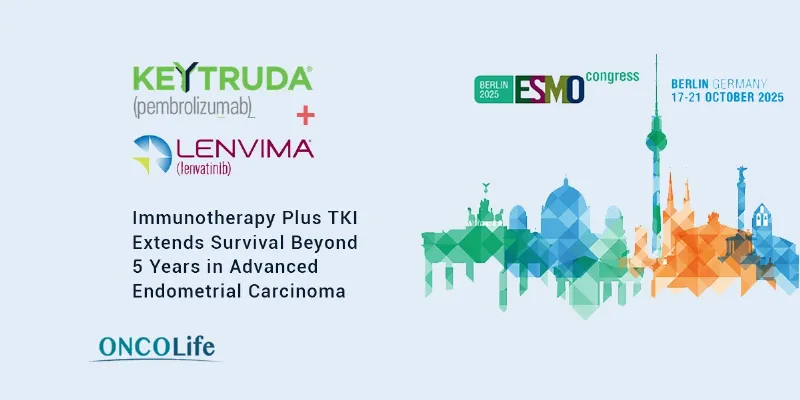Lenvatinib Plus Pembrolizumab Delivers Durable 5-Year Survival in Endometrial Carcinoma

20 October 2025
Five-year follow-up results from the Phase 3 Study 309/KEYNOTE-775, presented at ESMO 2025, confirm that lenvatinib plus pembrolizumab delivers a durable survival advantage over chemotherapy in advanced endometrial carcinoma. In the pMMR subgroup, five-year overall survival reached 16.7% versus 7.3% with chemotherapy, with a median OS of 18.0 versus 12.2 months, reaffirming the combination’s long-term efficacy and consistent safety profile.
At the 2025 European Society for Medical Oncology (ESMO) Congress, Eisai and Merck reported five-year follow-up results from the pivotal Phase 3 Study 309/KEYNOTE-775, demonstrating that the combination of lenvatinib (LENVIMA®) and pembrolizumab (KEYTRUDA®) provides a sustained overall survival (OS) advantage over chemotherapy in patients with advanced endometrial carcinoma previously treated with platinum-based therapy. The findings represent the longest follow-up to date for any trial evaluating an immunotherapy plus tyrosine kinase inhibitor (TKI) combination in this patient population.
Durable Survival Gains at Five Years
After a median follow-up of nearly 69 months, the five-year OS rate among patients with mismatch repair-proficient (pMMR) tumors reached 16.7% with lenvatinib plus pembrolizumab versus 7.3% with physician’s choice chemotherapy (doxorubicin or paclitaxel). Median OS was 18.0 months (95% CI, 14.9–20.5) for the combination versus 12.2 months (95% CI, 11.0–14.1) with chemotherapy.
Results were consistent in the all-comers population (which included both pMMR and mismatch repair-deficient [dMMR] tumors), where the five-year OS rate was 19.9% versus 7.7%, and median OS reached 18.7 months versus 11.9 months, respectively (HR 0.66; 95% CI, 0.57–0.77). Progression-free survival (PFS) followed a similar pattern.
In the pMMR subgroup, the five-year PFS rate was 6.3% for the combination compared with 2.1% for chemotherapy. Median PFS was 6.7 months versus 3.8 months, respectively. For the all-comers population, five-year PFS rates were 9.8% versus 3.2%, and median PFS 7.3 months versus 3.8 months.
“Five-year follow-up data from the Study 309/KEYNOTE-775 trial show sustained survival benefit in patients treated with pembrolizumab plus lenvatinib and underscore the role of this combination as an effective treatment option for patients with advanced endometrial carcinoma who need further treatment after receiving prior platinum-based therapy,” said Dr. Vicky Makker, principal investigator and gynecologic medical oncologist at Memorial Sloan Kettering Cancer Center.
Consistent Benefit Across Subgroups
Although the study was not powered for subgroup analysis, patients with mismatch repair-deficient (dMMR) disease also showed clinically significant improvement across efficacy endpoints. In this group, the five-year OS rate was 36.5% for lenvatinib plus pembrolizumab compared with 9.8% for chemotherapy alone. Median OS was 31.9 months versus 8.6 months, and median PFS was 14.8 months versus 3.7 months, respectively.
Study Overview
Study 309/KEYNOTE-775 (NCT03517449) enrolled 827 patients (411 assigned to lenvatinib plus pembrolizumab and 416 to chemotherapy). The trial included both pMMR (n=697) and dMMR (n=130) disease. Patients had received at least one prior platinum-based regimen, and randomization was 1:1 between the combination and chemotherapy.
Primary endpoints were OS and PFS assessed by blinded independent central review (RECIST v1.1). Secondary endpoints included objective response rate (ORR) and safety. At five years, the ORR for the combination reached 32.4% in the pMMR subgroup and 33.8% in the overall population, compared with approximately 15% for chemotherapy.
Safety Profile and Tolerability
Treatment-related adverse events (TRAEs) were reported in 97.3% of patients receiving lenvatinib plus pembrolizumab and 93.8% of those receiving chemotherapy. Discontinuations due to TRAEs occurred in 40.1% (including 16% who discontinued both agents) versus 8% in the chemotherapy arm. The most common adverse events (≥20%) with the combination were hypertension (61.8%), hypothyroidism (55.7%), diarrhea (43.3%), nausea (40.1%), decreased appetite (37.9%), fatigue (28.8%), proteinuria (27.6%), and weight loss (22.7%). Importantly, no new safety signals emerged over five years, and the profile remained consistent with previous analyses.
"The five-year results represent the longest reported follow-up for a trial evaluating an immunotherapy plus tyrosine kinase inhibitor combination in advanced endometrial carcinoma," said Dr. Corina Dutcus, Senior Vice President at Eisai. “These findings demonstrate the continued overall survival benefit observed with LENVIMA plus KEYTRUDA, further supporting the combination’s therapeutic value for patients facing this disease.”
Regulatory Context and Clinical Implications
Based on earlier data from this trial, the lenvatinib–pembrolizumab combination already holds regulatory approval in the United States for patients with pMMR or non–MSI-H advanced endometrial carcinoma progressing after prior systemic therapy and not eligible for curative surgery or radiation. It is also approved in the European Union and Japan, regardless of mismatch repair status.











Comments
No Comments Yet!